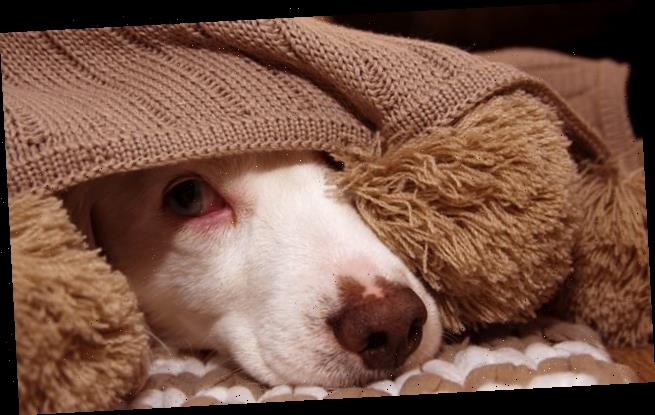Dogs are less likely to be scared of fireworks and thunder if they mix with other pet pooches when they are puppies
- Almost half of all dogs in the UK (45%) are scared of the noises from fireworks
- Researchers investigated the factors which lead to fear of thunder and fireworks
- Found socialising with other dogs when young decreases chance of fearfulness
- Age, number of dogs in a house, breed and whether they have been neutered also influence likelihood of being scared
For many dog owners, thunderstorms and bonfire night are chaotic events, marred by a barking pet pooch that whimpers relentlessly due to the loud noises.
Thunder and pyrotechnics both elicit a similar reaction in some dogs, and Finnish scientists looked into what leads to some dogs being more fearful than others.
They found that puppies that socialise with other dogs when they are growing up are less likely to be afraid of the commotion.
Other factors were also found to be linked to canine fearfulness, including breed, age and whether or not they’ve been neutered.
Data from the RSPCA shows almost half (45 per cent) of all dogs in the UK are scared of fireworks.
Scroll down for video
Thunder and fireworks both elicit a similar scared reaction in some dogs, and Finnish scientists looked into what leads to some dogs being more fearful than others (stock)
Dogs that exercised between one and three hours a day were less afraid of thunder than those that exercised more than 3 hours daily.
Also, big dogs are less likely to be scared of a thunderclap than a small dog.
Researchers say that while some genetic factors are beyond the control of owners, socialisation in early life may be one way of reducing fearfulness as dogs age.
Pet owners in Finland were asked to fill out a questionnaire on their dog and any anxiety-related behavioural problems the pet has, as well as how they react to certain stimuli.
Behavioural problems are leading welfare issues in domestic dogs, and previous research has found that almost three-quarters of pet dogs have some form of serious behavioural issue.
The latest questionnaire resulted in data on 7,809 dogs that were not scared of the noises and 1,704 who were.
The average age of the animals was 4.7 years and ranged from 2-month-old pups to 17-year-old wiley veterans.
Dogs with a lower socialisation score were found to be more scared of both noises.
‘We found breed differences in the likelihood of fear of fireworks,’ the researchers write in their study.
‘The most fearful breeds were Cairn Terrier, mixed breed, and Pembroke Welsh Corgi: the least fearful breeds were Labrador Retriever, German Shepherd Dog, and Miniature Poodle.’
How to keep dogs safe during fireworks
- Make sure your dog or cat has somewhere to hide – perhaps under some furniture or in a cupboard – and can get to it at any time.
- Ensure your pet is kept in a safe and secure environment and can’t escape
- Make sure your pets are microchipped in case they do escape
- During fireworks season, walk dogs during daylight and keep pets indoors when fireworks are likely to be set off
- At nightfall, close windows and curtains and put on music to mask and muffle the sound of fireworks
Source: RSPCA
As dogs grow older, the chance increases that they will be scared of fireworks and thunder, up until 10 years old.
After this somewhat elderly stage in life, the dogs become less likely to be scared of the bangs, the study finds.
Dogs that had never done any form of obedience training were more likely to be scared, as are dogs that are an ‘only pet’.
Although there was no difference in the sex of a pet, neutered animals were more likely to be fearful of the noises.
When it comes to the rumbling tones of a thunderstorm, the less bothered breeds include the Miniature Poodle, Chinese Crested Dog, and Labrador Retriever.
On the flip side, Lagotto Romagnolo, Cairn Terrier, and Rough Collie were the most fearful breeds.
‘Large dogs were less likely to have fear of thunder than to small dogs, but there was no significant difference between small and medium dogs, or between medium and large dogs,’ the scientists add.
Fear of loud noises such as fireworks is a treatable condition but requires time and focus from both pet and owner.
RSPCA animal behaviour expert Dr Samantha Gaines said: ‘If your dog is frightened of fireworks your vet may suggest referral to a clinical animal behaviourist to teach him/her to deal with the sounds, or the use of diffusers which disperse calming chemicals into the room.
‘It is also a good idea to provide your dog with a safe haven.
‘It is best to get your dog used to this before the season starts. Choose somewhere quiet and help him to learn that being there is positive and that no harm will come to him.
‘And if you are using fireworks yourself, please only do so on traditional celebration dates like Bonfire Night, when most animal owners will be expecting fireworks and will hopefully have made preparations to help their animals cope.’
The full findings are available in the journal Scientific Reports.
Source: Read Full Article

